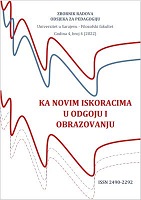RAZLIKE U NAČINU RJEŠAVANJA KONFLIKTA S OBZIROM NA VJEŠTINE KOMUNIKACIJE I UNUTRAŠNJE RADNE MODELE
DIFFERENCES IN CONFLICT RESOLUTION BASED ON COMMUNICATION SKILLS AND INTERNAL WORKING MODELS
Author(s): Bojana Marinković, Katarina Berjan, Jelena Dragaš, Snježana Spasojević, Tamara Gogić, Bojana BijelićSubject(s): Communication studies, Theory of Communication, Higher Education , Methodology and research technology
Published by: Filozofski fakultet Univerziteta u Sarajevu
Keywords: internal working models; conflict resolution; communication skills;
Summary/Abstract: The problem of this research is related to the examination of differences in the way of conflict resolution with regard to communication skills and internal working models. The relationship between four attachment styles (secure, preoccupied, avoidant and fearful) and five conflict resolution styles (dominating, avoidant, cooperative, compromising and adaptive) was examined, including communication skills. The research was conducted on a sample of undergraduate students at the University of East Sarajevo. The sample consists of 108 students, of which 99 (79.20%) are female and 26 (20.80%) are male. The age range is from 19 to 24 years. From the statistical procedures, T-test or non-parametric substitution, Mann Whitney test and Spearman's correlation coefficient were used. The research hypothesis was confirmed. Based on the results, it can be concluded that there is a statistically significant and small negative correlation between the negative internal working model of the other and the avoidant turtle conflict resolution style. By analyzing the obtained data, it can be concluded that there is a statistically significant difference in the expression of assertiveness in competitive sharks and evasive turtles. This style is characterized by more aggressive problem solving through a violent, competitive approach when solving conflicts and relationships are not important to them. The results indicate that these people are non-assertive. These results indicate that in our culture we resolve conflicts either passively or aggressively, that we do not have the developed awareness and skills to assertively resolve conflict situations.
Journal: Zbornik radova Odsjeka za pedagogiju
- Issue Year: 4/2022
- Issue No: 4
- Page Range: 129-140
- Page Count: 12
- Language: Bosnian

